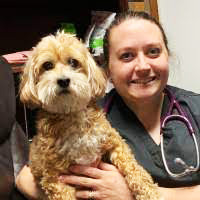
This article was updated on August 18th, 2022
Your situation:
✓ your dog is a senior dog
✓ your dog is no longer eating
✓ your dog is showing other signs of illness
(If this is NOT your situation, click here.)
There are many health conditions that can be seen in older dogs that can cause a loss of appetite as well as other signs of illness such as:
- Drinking a lot of water: If your dog is drinking a lot of water, diseases such as Cushings disease, diabetes, hypothyroidism or other electrolyte imbalance may be the cause. These diseases can also cause dogs to stop eating.
- Urinating a lot: Dogs who are peeing a lot can have a urinary tract infection, urinary incontinence, or diabetes.
- Not able to walk normally: As dogs get older they can develop back and joint issues. Neurologically issues such as strokes or seizures can also cause your dog to walk like they are drunk (in addition to losing appetite).
- Breathing heavily: Older dogs can start to develop issues breathing normally. They may constantly be panting. Diseases such as heart failure, cancer, and obesity can cause a loss in appetite as well as heavy or fast breathing. Read our article on dogs with heavy or fast breathing to learn more.
- Coughing: Many older dogs will start to cough as they get older. Diseases such as heart failure, cancer, collapsing trachea, largeneal paralysis can cause your dog to cough more and want to eat less.
- Pawing at their eyes: Eye infections can be seen in dogs of any age. The first sign that many pet owners notice is that they are pawing at their eye and their eye is very red and inflamed.
If your dog has any signs of illness, they can also not be eating as much as they normally do. This can be due to the fact that they do not feel their best. If your dog is not eating and showing any of these other signs, it would be best for your dog to see your veterinarian quickly. Your vet can run bloodwork, take x-rays and perform other tests to see why your dog isn’t feeling well – this will help them come up with the right treatment plan to help your dog as fast as possible.
While your wait for your vet appointment, you can also read this article for practical tips from our veterinarian team to help your senior dog eat more:
Disclaimer: This website's content is not a substitute for veterinary care. Always consult with your veterinarian for healthcare decisions. Read More.


Be the first to comment